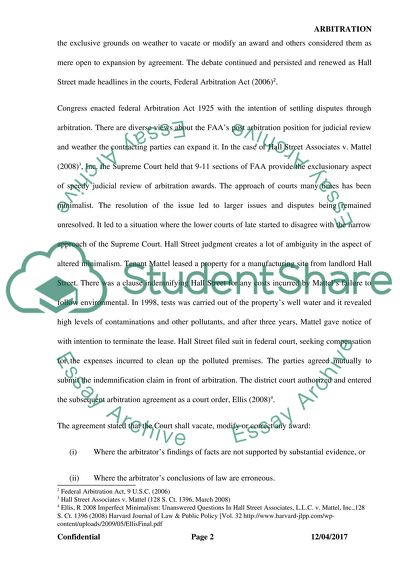Cite this document
(“Discuss and evaluate the right of the parties to challenge an arbitral Essay”, n.d.)
Discuss and evaluate the right of the parties to challenge an arbitral Essay. Retrieved from https://studentshare.org/miscellaneous/1560378-discuss-and-evaluate-the-right-of-the-parties-to-challenge-an-arbitral-award-on-grounds-of-error-of-law-in-the-context-of-the-position-taken-in-the-united-states-see-eg-hall-street-assoc-v-mattel-128-s-ct-1396-2008-and-the-review-provisions-o
Discuss and evaluate the right of the parties to challenge an arbitral Essay. Retrieved from https://studentshare.org/miscellaneous/1560378-discuss-and-evaluate-the-right-of-the-parties-to-challenge-an-arbitral-award-on-grounds-of-error-of-law-in-the-context-of-the-position-taken-in-the-united-states-see-eg-hall-street-assoc-v-mattel-128-s-ct-1396-2008-and-the-review-provisions-o
(Discuss and Evaluate the Right of the Parties to Challenge an Arbitral Essay)
Discuss and Evaluate the Right of the Parties to Challenge an Arbitral Essay. https://studentshare.org/miscellaneous/1560378-discuss-and-evaluate-the-right-of-the-parties-to-challenge-an-arbitral-award-on-grounds-of-error-of-law-in-the-context-of-the-position-taken-in-the-united-states-see-eg-hall-street-assoc-v-mattel-128-s-ct-1396-2008-and-the-review-provisions-o.
Discuss and Evaluate the Right of the Parties to Challenge an Arbitral Essay. https://studentshare.org/miscellaneous/1560378-discuss-and-evaluate-the-right-of-the-parties-to-challenge-an-arbitral-award-on-grounds-of-error-of-law-in-the-context-of-the-position-taken-in-the-united-states-see-eg-hall-street-assoc-v-mattel-128-s-ct-1396-2008-and-the-review-provisions-o.
“Discuss and Evaluate the Right of the Parties to Challenge an Arbitral Essay”, n.d. https://studentshare.org/miscellaneous/1560378-discuss-and-evaluate-the-right-of-the-parties-to-challenge-an-arbitral-award-on-grounds-of-error-of-law-in-the-context-of-the-position-taken-in-the-united-states-see-eg-hall-street-assoc-v-mattel-128-s-ct-1396-2008-and-the-review-provisions-o.


